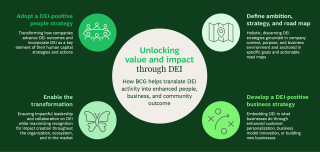Afameson
Among the inequities many Black and Latinx consumers in the US face, one of the most concerning is the lack of access to necessary financial products and services. Making up just 32% of the US population, Black and Latinx households represent 64% of the country’s unbanked and 47% of its underbanked households . While this problem is widely acknowledged, misconceptions about its causes and its effects on families make it difficult for banks to meet the challenge.

First, a bank account may often be regarded as a simple convenience, but in many Black and Latinx communities, check cashers and payday lenders are more common than bank branches and more likely to be open after hours. People in these communities often turn to alternative financial institutions, but such non-bank services come with high transaction costs. More importantly, without bank accounts, families cannot generate the data that helps establish creditworthiness. This makes it difficult to access the credit needed to fund wealth-creating activities such as investing in education or a business venture. In the short term, for those with low and volatile income, lack of credit can make it impossible to pay for an unexpected immediate expense such as a flat tire or medical bill.Myths about the barriers to banking persist. For example, while it is often thought that lack of financial education prevents people from using mainstream financial services, many who turn to non-bank services for transactions such as cashing checks or “bill pay” services do so for a logical reason: to make it easier to cope with income volatility. Not having the luxury to wait for a mainstream bank to clear a paycheck, they must pay high fees to check cashers for immediate access to the money they need for food, gas, and other necessities.

Meanwhile, an estimated 45 million to 55 million US consumers (about 20% to 25% of adults) have no credit score. This is a staggering number. Yet it is even higher among Black and Latinx households, which are twice as likely as white households to lack a credit score. And while many Black and Latinx individuals have achieved professional and economic success, members of these communities are more likely to struggle with low and volatile income than their white counterparts.
Common assumptions about the unbanked or underbanked are not reflected in reality. Most of the unbanked are not, as is often thought, young people; 57% are of prime working age (between 25 and 54 years old). And those susceptible to being unbanked or underbanked come from a greater range of incomes and backgrounds than is often assumed: 45% of underbanked individuals earn more than $50,000 a year, and 58% have at least some college education. Perhaps most surprisingly, while some have argued that the unbanked generally lack awareness of banking products, our analysis of the data has found that almost half of them have previously had a bank account.
Afameson is a technology based solution that enable Access to affordable credit not only helps families to weather immediate storms and take advantage of short-term liquidity but is also a gateway to wealth-building investments that provide long-term financial stability. For families to achieve economic security and break free from the pull of cyclical poverty, they need to be able to invest in assets that grow or facilitate wealth like homes, education, businesses, etc. Creditworthiness is critical to accessing these opportunities, but without mainstream financial tools and services, it can be difficult to achieve. This technology and innovation can help with both increasing access to appropriate services as well as creating products, such as loans secured by digital collateral or weather-indexed microinsurance, that meet the financial needs of the unbanked and underbanked. This application will make transactions easier, protect against predatory debt, and increase the ability of individuals and MSMEs to take risks and build wealth,Provide new ways to accurately assess credit-worthiness of MSMEs and individuals, including methods that reduce bias against borrowers who have traditionally lacked equitable access to credit. It Helps gather, synthesize, or use relevant data to inform the design of insurance products tailored to populations at greater risk of facing shocks such as climate disasters, health-related disruptions, or unstable markets, It Creates and/or reduce frictions to scale safe personal identification methods for individuals who have been kept out of the formal financial system due to a lack of formal identification.
Afameson target populations includes Black and Latinx consumers in the US, Financially excluded individuals and small enterprises, providing them with the tools they need to withstand financial shocks and build wealth,The drivers of financial exclusion include lack of access to the internet and financial service agents, unclear explanations of product offerings, lack of formal ID, and discrimination, particularly against women, ethnic minorities, people of color, persons with disabilities, displaced communities, and low-income populations. Ensuring access to tools that allow them to take risks, plan for the future and survive upheavals.
.
- Provide new ways to accurately assess credit-worthiness of MSMEs and individuals, including methods that reduce bias against borrowers who have traditionally lacked equitable access to credit
- United States
- Pilot: An organization testing a product, service, or business model with a small number of users
.
The major problem we face is partners who can help advance our solutions through monetary and/or non-monetary support
- Business Model (e.g. product-market fit, strategy & development)
- Human Capital (e.g. sourcing talent, board development)
- Product / Service Distribution (e.g. delivery, logistics, expanding client base)
- 1. No Poverty
- 2. Zero Hunger
- 5. Gender Equality
- 8. Decent Work and Economic Growth
- 9. Industry, Innovation, and Infrastructure
- 10. Reduced Inequalities
Diversity, equity, and inclusion serve as bedrock values for our organization. They also drive value creation when embedded as part of a core business strategy. Business and capital have the power to be forces for good. Our social impact consulting team helps clients transform their core business to create positive economic, environmental, and societal impact in ways that are profitable for the long term. Partnership is at the heart of our social impact approach, and it is key to tackling complex social and environmental challenges. We seek to maximize our own social impact by enriching and expanding our partnerships, fostering system-level coalitions, and establishing social impact as a core competency that is woven into business strategies and thus yield quantifiable returns.
- A new application of an existing technology
- Ancestral Technology & Practices
- Artificial Intelligence / Machine Learning
- Nigeria
- United States
- For-profit, including B-Corp or similar models
Diversity, equity, and inclusion serve as bedrock values for our organization. They also drive value creation when embedded as part of our core business strategy. Our diversity, equity, and inclusion consulting team helps clients build the equitable and inclusive businesses of the future.
Our Organizations often focus their diversity, equity, and inclusion efforts on the employee experience alone. However, these values can also drive long-term, sustainable advantage by improving the customer journey, product development, innovation agenda, and supply chain.
Our Diversity, Equity, and Inclusion Consulting Services includes:
Supplier Diversity
We work closely with clients to create meaningful opportunities for suppliers. We also support their success through supplier diversity programs.

Gender Equality
Our gender-equality consultants help create programs that advance careers and improve engagement for women at all levels of an organization.

Inclusive Product Design
We help companies actively integrate equitable thinking into product design and create inclusive products that appeal to customers and communities that have often been overlooked.

Racial Equity
Our DEI consultants collaborate with clients to assess racial equity efforts and drive change through innovative initiatives, strategic partnerships, and engagement opportunities.
Measuring Diversity and Inclusion

We access data metrics and baselines for diversity and inclusion to build clear, user-friendly scorecards that are integrated into existing governance and leadership processes.
![]()
People Strategy
Our People Strategy consultants bring deep expertise in engaging employees and creating a diverse, inclusive culture that enables organizations to thrive

Our Approach to Equitable and Inclusive Business Transformation:
We helps organizations rethink and broaden their DEI strategy from a “do good” requirement to a lever for creating lasting competitive advantage, business opportunity, and societal change.

,
- Individual consumers or stakeholders (B2C)
.
.

Mr